Talking School
I think of my books not as textbooks but as cheeky guides to writing. Maybe that’s why students like them! I’ve been thrilled to learn that they are used by teachers to infuse their wards with a love of language as well as a love of getting things right. And so I have created two suites of lectures, discussions, exercises, and prompts for the classroom. Constance Hale’s Lesson Plans for Teachers is available as an e-book on various platforms. Find more information and links below, under "Resources for YOU." Of course, teachers in the trenches have their own tips and tricks—not to mention war stories. This area really belongs to those teaching students how to explore ideas, express feelings, and expand inchoate thoughts into intelligible essays. If you’d like to share thoughts with colleagues, please send them to me. Perhaps I should rename this area “talking out of school”—it’s meant as a place for unvarnished conversation.
| |
Resources for YOU!
My gift to writing teachers
I’ve recently turned a longtime dream into a reality: I’ve published a book of lesson plans for teachers who use Sin and Syntax in the classroom. This is something I have been working on since 2008. I kept adding to the lesson plans, teaching more workshops, expanding my dream, and imagining the day when I would stop tinkering, seriously edit them, find a copy editor, and put the materials into some more credible form than a Word document. This material is now an e-book, easily available.
| |
Matthew Zapruder and friends on poetry for kids
A veteran teacher of verse introduces poetry to young minds
On November 13, 2017, my friend and colleague Matthew Zapruder started a thread on Facebook seeking ideas for teaching poetry to kids. Matthew is not just a writer of most-memorable lines, but also the author of Why Poetry (Ecco, 2017) and a veteran teacher of verse—but not to elementary school students. His friends delivered in spades, brainstorming, sharing tips, and showing their own offbeat creativity. It all makes for a bracing palaver about poetry.
| |
Thomas Roddy on "showing up" as a teacher
An English teacher reflects on the value of being present
Not long ago a family friend asked me, “What is it that allows you to do what you do?” Without hesitating I told her that I felt teaching was my calling. Shortly after I started working at the inner-city school where I have taught for the last ten years, I realized that my love of literature alone would not be enough to sustain me. My students struggle to maintain basic skills; sustained critical reading happens sporadically in my classroom. To prevent quitting altogether, I needed something else to keep me curious. So I asked myself another question: “How can I help my students grow into their best selves?”
| |
Kate Brubeck on breathing life into language
A teacher at Mills College observes students making grammar their own
The first day of Fundamentals of Grammar for Academic Writers has met. No chalk in our room (or any others on the same floor). No administrative assistant in the office to get some from. And a pedant in the front row trying to engage me in discourse about the display of well-worn style manuals, which he has fanned before him like certificates of pedigree. (“I write reviews,” he tells me, “for Amazon.”)
But, all things considered, the day has gone well.
| |
Ebony Haywood on her own grammar journey
A “rookie” finds her way and shares an exercise that works
I teach ninth grade English at Dominguez High School in Compton, California. In June, I completed my first year as an English teacher, and it was no small feat. Prior to my English gig, I taught music for nine years. The leap from music to English, from elective to compulsory, frightened me. My fear morphed to frustration as I tried teaching my students how to write. I didn’t know how to help them improve. Then the rookie English teacher gods knocked some sense into my head and said, “Ebony, you have to teach them grammar—explicitly.”
| |
Nick Ripatrazone on teaching writing as craft
A former English teacher reflects on the profession
{Connie Hale here.... I usually use this section of the website for guest posts by teachers, but I’m doing a little cheat here. Nick Ripatrazone recently wrote an essay called “55 Thoughts for English Teachers,” for The Millions, an online magazine offering coverage on books, arts, and culture since 2003. (The New York Times called it an “indispensable literary site.”)
Ripatrazone has written six books of fiction and poetry. Despite his delicious Italian name, he teaches English, and has for 10 years. In the essay he shares his inspiring reflections on the profession.}





